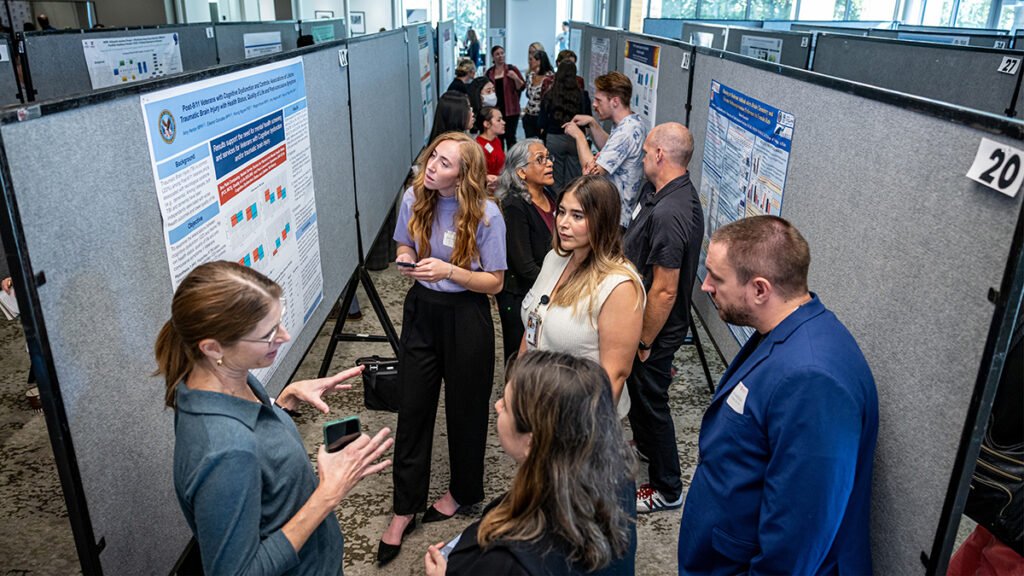Reprinted from U of U Health.
Mental health problems are one of the most common causes of disability, affecting more than one billion people worldwide. Dealing with mental health issues can be extremely challenging. What can health care providers do to help those in the most vulnerable situations? How do physical brain changes affect our thinking and experiences? After all, , how can everyone get the care they need?
Answering these questions was the common goal of researchers who participated in the Mental Health, Brain and Behavioral Sciences Research Day at the University of Utah in September. Although the problems they faced were serious, the new solutions they began to build could ultimately help improve mental health care at an individual and societal level.
“We’re building something without a blueprint,” said Mark Rapaport, MD, CEO of the Huntsman Mental Health Institute. “We are developing new and lasting ways to address some of the most difficult problems facing society.”
The day’s theme reflected the diverse approaches needed to improve mental health care.
AI and mental health
Artificial intelligence (AI)-based analytics is improving mental health care by detecting patterns in vast amounts of information, alerting people at high risk of mental health problems, and enabling better preventive care. It can change dramatically.
Dr. Nina de Lacy, assistant professor of psychiatry at Spencer Fox Eccles School of Medicine (SFESOM), uses AI to understand which social factors can predict mental health problems .
Dr. Christopher Gregg, professor of neurobiology at SFESOM, focuses on patient video data to analyze facial expressions and gestures, ideally providing a diagnosis and predicting a wide range of risks.
Guest speaker Eric Aktaiz, MD, professor and professor of psychiatry at Western Michigan University, said that while technology has great potential to bring people better mental health care, AI tools can fail in unexpected ways. He argued that there is a need for the following precautions: Expert human involvement.
working brain
Other researchers have dived inside mental health by studying how our brains function and malfunction.
Dr. Randall Peterson, dean of the College of Pharmacy (COP), said his lab is using high-throughput testing in zebrafish to analyze hundreds of compounds to help improve mental health problems such as opioid addiction. He explained how he is working to find better drugs. day.
Dr. Via DePaula Silva, assistant professor of pharmacology and toxicology at COP, studies how viral infections of the brain can cause epilepsy, a common and incurable neurological disease. .
Dr. Emily Dennis, assistant professor of neurology at SFESOM, studies how traumatic brain injury causes long-term changes in brain anatomy.
Dr. Corey Inman, assistant professor of psychology in the School of Social and Behavioral Sciences, uses advanced mobile brain imaging equipment to observe how memories are created in the real world.
ethics and society
Mental health research is closely intertwined with social and ethical issues, which was the focus of many speakers.
Dr. Lynn Maxfield, associate professor of vocal studies in the School of Music, and Dr. Rebecca Zarate, associate dean for research in the College of Fine Arts, are researching how participation in the performing arts impacts mental health . Particular focus will be placed on how group performance and the presence of a wider audience change the situation.
Zoe Robbins, DNP, clinical assistant professor in the College of Nursing, introduced a model that connects rural patients to mental health services through telehealth and a faculty practice model.
Brent Kius, MD, associate professor of psychiatry, spoke about ethical issues related to psychiatry in very severe cases.
Dr. James Taberley, a philosophy professor in the College of Humanities and Sciences, describes the sterilization of mentally ill people without their consent, from the overt eugenics practices of the 1920s to current state laws that continue to legalize forced sterilization. I traced the history of Utah.
The wide-ranging talks reinforced the belief that mental health is a very serious and complex issue that requires the dedicated efforts of researchers from the health sciences and beyond.

